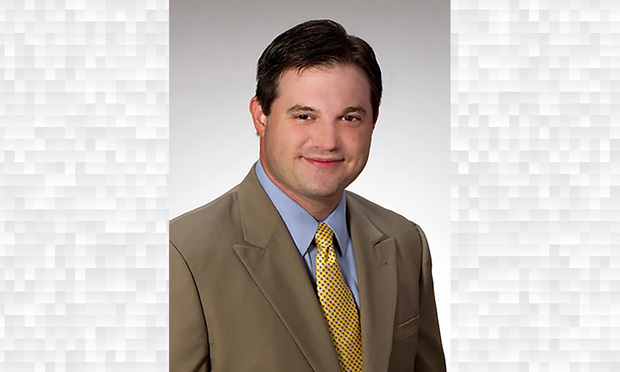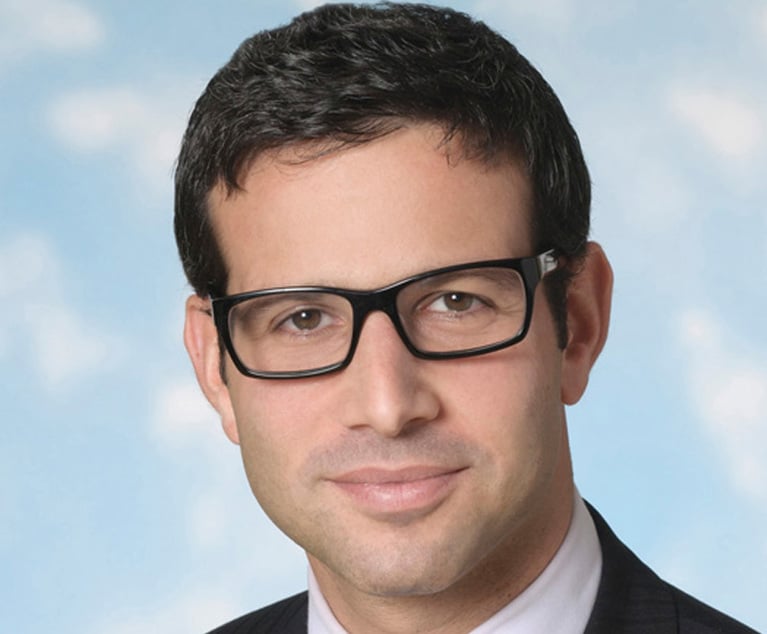On the Rise 2018: F. Daniel Knight
F. Daniel Knight, shareholder, Chamberlain Hrdlicka
August 31, 2018 at 06:00 AM
12 minute read
 Daniel Knight, with Chamberlain, Hrdlicka, White, Williams & Aughtry.
Daniel Knight, with Chamberlain, Hrdlicka, White, Williams & Aughtry.
F. Daniel Knight, shareholder, Chamberlain Hrdlicka
Experience:
- Chamberlain Hrdlicka, 2007-present
- Brown Sims, 2005-2007
- Stepp & Sullivan, 2003-2005
Education:
- University of Texas School of Law, 2003
- University of Texas at Austin, 2000
What drew you to a career in law?
My mom was a public school teacher for 35 years in the Houston area. She graduated from The University of Houston. My father was a welder (after enlisting to serve in the Navy in Vietnam and then riding bulls professionally for 3-4 years) who started a welding supply business in the late 70s. He attended a semester of college but obviously didn't graduate. None of my grandparents went to college, much less graduated from it. So, I don't come from a family of lawyers.
The IRS audited my dad's company several years in a row in the late 80s and early 90s. He didn't do anything wrong, and to my knowledge never had to pay anything extra. However, it took a big toll on him, and he was always frustrated with the process, as it was the same IRS agent leading the audit every year. After seeing that as an 8-12 year old, I figured that if I became a lawyer, I could avoid getting the run around myself and protect other people from the same. I also participated in theater as well as debating/public speaking in high school, and I developed skills that I thought would translate well into the legal world. It seemed like a good fit, skill-set wise, to me.
Have you set a specific goal that you want to achieve in the next year
For a long time, I was a workhorse associate who handled other people's work. In the process, I've developed a book of business that allowed me to become a Shareholder at Chamberlain Hrdlicka. Next year, I want to continue to grow and diversify that book of business. To do so, I plan to network outside of my comfort zone across Houston. I want to develop relationships where I (and our Firm) can help small and mid-sized companies resolve their tax, corporate structuring, intellectual property, commercial, labor and employment, maritime, insurance, or casualty legal issues, both before they reach a critical stage and after litigation or arbitration is the only option. I've already started doing that, and want to double the amount of commercial litigation I originate and handle in 2019.
Another goal for the next year is to do at least one presentation for the Houston Bar Association Speaker's committee each month. I enjoy giving “The Importance of Jury Service” speech to high school kids. It gives me a chance to talk to them not just about an important civic duty, but also to talk to them about the profession as well as give advice to anyone who is interested in pursuing a legal career.
What has been your proudest career moment and your biggest hurdle?
The proudest moment of my career was made possible thanks to its biggest hurdle.
When I first joined Chamberlain Hrdlicka, I fell into a trap of doing work for only one senior attorney. I always had my hours and always made good money. But for the first seven years I was with the firm, I didn't develop much in the way of my own client base.
Chamberlain Hrdlicka is different from most other law firms its size in that to be considered for shareholder, an attorney not only must have sufficient hours billed and collected, but also generate and collect a pre-determined dollar amount of original work. One must do this for 2 years to be put up for Shareholder. So, I was kind of in a rut: I had a good job and got to do interesting work (as well as make good money) but I didn't have my own business to be considered for shareholder.
My boss told me in 2014 he intended to leave Chamberlain, and asked me to go with him to his new firm. I declined, and bet on myself that I could develop enough business to not only justify my employment at my current Firm, but allow me the opportunity to become a Shareholder. The other Shareholders in our Litigation section (as well as other Shareholders throughout the Firm) really helped me to find work and work on my marketing skills. In 2015 I had enough work billed, but couldn't collect before the end of the year. In 2016 and 2017, I hit my numbers, thus being elevated from Senior Counsel to Shareholder.
Where do you fit on a 1-10 work-life balance scale with 10 being nirvana? Please explain.
Overall, a 7. If I am not preparing for trial or traveling, an 8.
I have two children, an 8 year old daughter (Gwendolyn) and a 5 year old son (Coleman). They are fascinating and wonderful people, and I enjoy spending time with them. So, I do what I can (taking them to school in the mornings or leaving work at 5:30 p.m. to be home for dinner/bed time), so I can spend some time with them every day.
I rarely saw my dad during a normal work week when he and my mom were married. His office was in the Houston Ship Channel and we lived in Friendswood, close to Alvin. It took him between 60 to 90 minutes to get to his office, depending on traffic.
When I decided to get married, my wife and I hoped to have children. When we did, I changed my work hours, so I could be around my children when they were awake. I'll work on the weekends or in the evenings from home to get done what needs to get done, but I'm making a conscious effort at actually being around and spending time with my children, attending their activities, etc. It helps that I work downtown and live in the Heights, so I don't have near as bad of a commute as my father did.
What is the top quality that you've used to succeed in the profession?
I have a very good memory. When I'm focused on a case or preparing for trial, I have an overarching goal of being the most knowledgeable person in the room concerning the facts and documents in my case. I usually am, and normally my clients do well as a result.
Outside of work, it helps on trivia night, as I retain random bits of information from history or pop culture.
Who is your favorite mentor and why?
I've been fortunate to have many excellent mentors and teachers in my life. I'd pick David Robertson and Michael Sturley, two of my professors from law school. Despite going to law school in Austin, Texas (which is nowhere near a navigable water) I was fortunate to learn from two of the finest legal minds in the field of Admiralty and Maritime law in the country.
They taught me the fundamentals of Admiralty and Maritime law and how to think “like a lawyer.” But, more importantly, they taught me (and continue to teach me) the importance of civility, professionalism, and, most of all, to keep asking not just what the law is, but why the law is what it is and should the law be that way.
What's the best advice anyone has ever given you?
Try to see the donut, not the hole.
What trends are you observing in the profession that you're excited about?
I see a trend to move away from formality. Some of that is good, in my opinion. For example, the generic legalese found in most form pleadings is unnecessary and superfluous. Clients don't like it in reports or their documents, and Judges/Arbitrators certainly don't like it either. What does “Comes now the plaintiff, Jane Doe” do for any legal pleading except make it longer?
However, I also think some of the formality is necessary to separate attorneys from other professionals. I always recall the advice I received from a close family friend, Professor Hans Lawton. When I told Professor Lawton I planned to go to law school, he told me to always remember to dress like a lawyer, because if you looked like a lawyer, you'd act like one.
What is the greatest challenge you see for the legal profession?
Overall, I think the greatest challenge is finding young lawyers, and training them properly. Talent identification, and mentorship of that talent, is how the profession continues well after we are all gone.
First, I see a trend toward a reduced pool of attorneys in the future. I think this is both positive and negative. On the positive side, one could easily argue that with two serious economic downturns in a 10 year period, many people sought law degrees not because of an interest in the law, but instead because “it sounded good” or “lawyers make good money.” There also was a glut of young attorneys coming out of law school who couldn't find jobs, and now I think there is a basic economic response – less people apply to law schools.
My understanding, from talking to various people in the legal education field, is that the overall pool of applicants to law schools is decreasing. This ultimately means law schools will take less students, generating less revenue. With declining funding for state-run colleges and universities as a national trend, this can only mean that tuition costs will go up. I'm afraid that attending law school may be cost prohibitive for some people who would carry on the profession in the years to come. So I think that the first challenge will be to find the talent that will constitute the next generation of lawyers, and convince them that law school is a good investment.
Once we find them, how will we train them once they are out of law school and pass the bar exam? Young attorneys learn the theory before we hire them, but normally learn the practical aspects of the profession in their first few years by serving in lower roles on projects or cases. There are two trends I see that pose a great challenge to the currently accepted model of training younger attorneys.
The first is artificial intelligence and rapidly improving technology. A huge challenge in the next 10-20 years is how lawyers will deal with algorithms and artificial intelligence that could possibly render much of the private firm litigation billing model obsolete.
To put this in context, the laptop I used in law school (a Mac iBook Special Edition) had a processing speed of 466MHz. 15 years later, the cell phone I own (an iPhone 8) is almost 6 times faster at 2390MHz. It used to be that you had to manually search electronic documents on Adobe Acrobat. Now, even the free program allows you to convert a scanned document into a searchable format, allowing for pinpoint highlighting of key terms and conditions.
I think it is reasonable, given the technology trends over the past 10 years, to expect in the next 20 years that most document review (either in large commercial litigation cases or corporate due diligence) could be conducted by a “bot” or computer program/algorithm. Normally, this is a task reserved for younger attorneys so they can learn the nuts and bolts of a transaction, or understand the facts behind a case in order to train them on how to draft appropriate motions or craft arguments for use in court.
For litigators such as myself, I think the second trend we face is continued legislation that reduces access of all parties to the court system and, particularly, jury trials. The opportunities to take a case to trial, and develop those skills, is not as available now as it was when I started practicing law. And, when I began my practice, the opportunities were already far less than they were 15-20 years before. It seems to me that the only place where opportunities abound to try cases is either through pro bono assignments or if you are a criminal attorney.
When you combine the technological advances with reduced opportunities, it begs the question of what tools can we use to train young lawyers working in private practice? I think answering that question will define how our profession develops over the next 10-20 years.
This content has been archived. It is available through our partners, LexisNexis® and Bloomberg Law.
To view this content, please continue to their sites.
Not a Lexis Subscriber?
Subscribe Now
Not a Bloomberg Law Subscriber?
Subscribe Now
NOT FOR REPRINT
© 2025 ALM Global, LLC, All Rights Reserved. Request academic re-use from www.copyright.com. All other uses, submit a request to [email protected]. For more information visit Asset & Logo Licensing.
You Might Like
View All
Kirkland's Daniel Lavon-Krein: Staying Ahead of Private Equity Consolidation

Vinson & Elkins: Traditional Energy Practice Meets Energy Transition
4 minute read
Advising 'Capital-Intensive Spaces' Fuels Corporate Practice Growth For Haynes and Boone
4 minute read
Get to Know Texas Lawyer's Attorney of the Year Finalists
Trending Stories
Who Got The Work
J. Brugh Lower of Gibbons has entered an appearance for industrial equipment supplier Devco Corporation in a pending trademark infringement lawsuit. The suit, accusing the defendant of selling knock-off Graco products, was filed Dec. 18 in New Jersey District Court by Rivkin Radler on behalf of Graco Inc. and Graco Minnesota. The case, assigned to U.S. District Judge Zahid N. Quraishi, is 3:24-cv-11294, Graco Inc. et al v. Devco Corporation.
Who Got The Work
Rebecca Maller-Stein and Kent A. Yalowitz of Arnold & Porter Kaye Scholer have entered their appearances for Hanaco Venture Capital and its executives, Lior Prosor and David Frankel, in a pending securities lawsuit. The action, filed on Dec. 24 in New York Southern District Court by Zell, Aron & Co. on behalf of Goldeneye Advisors, accuses the defendants of negligently and fraudulently managing the plaintiff's $1 million investment. The case, assigned to U.S. District Judge Vernon S. Broderick, is 1:24-cv-09918, Goldeneye Advisors, LLC v. Hanaco Venture Capital, Ltd. et al.
Who Got The Work
Attorneys from A&O Shearman has stepped in as defense counsel for Toronto-Dominion Bank and other defendants in a pending securities class action. The suit, filed Dec. 11 in New York Southern District Court by Bleichmar Fonti & Auld, accuses the defendants of concealing the bank's 'pervasive' deficiencies in regards to its compliance with the Bank Secrecy Act and the quality of its anti-money laundering controls. The case, assigned to U.S. District Judge Arun Subramanian, is 1:24-cv-09445, Gonzalez v. The Toronto-Dominion Bank et al.
Who Got The Work
Crown Castle International, a Pennsylvania company providing shared communications infrastructure, has turned to Luke D. Wolf of Gordon Rees Scully Mansukhani to fend off a pending breach-of-contract lawsuit. The court action, filed Nov. 25 in Michigan Eastern District Court by Hooper Hathaway PC on behalf of The Town Residences LLC, accuses Crown Castle of failing to transfer approximately $30,000 in utility payments from T-Mobile in breach of a roof-top lease and assignment agreement. The case, assigned to U.S. District Judge Susan K. Declercq, is 2:24-cv-13131, The Town Residences LLC v. T-Mobile US, Inc. et al.
Who Got The Work
Wilfred P. Coronato and Daniel M. Schwartz of McCarter & English have stepped in as defense counsel to Electrolux Home Products Inc. in a pending product liability lawsuit. The court action, filed Nov. 26 in New York Eastern District Court by Poulos Lopiccolo PC and Nagel Rice LLP on behalf of David Stern, alleges that the defendant's refrigerators’ drawers and shelving repeatedly break and fall apart within months after purchase. The case, assigned to U.S. District Judge Joan M. Azrack, is 2:24-cv-08204, Stern v. Electrolux Home Products, Inc.
Featured Firms
Law Offices of Gary Martin Hays & Associates, P.C.
(470) 294-1674
Law Offices of Mark E. Salomone
(857) 444-6468
Smith & Hassler
(713) 739-1250






